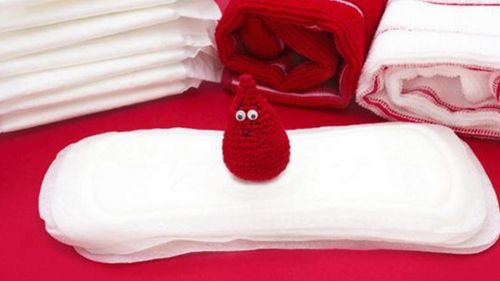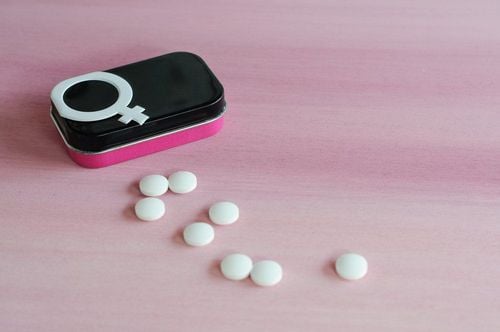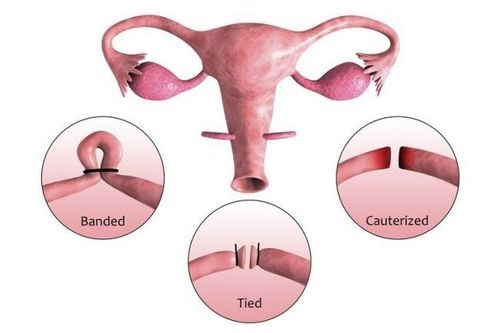This is an automatically translated article.
Jencycla is a hormone that works to prevent unwanted pregnancy by making vaginal fluid thicker to prevent sperm from reaching an egg and changing the lining of the uterus (womb) to prevent a fertilized egg from attaching. enter.1. What does Jencycla do?
Jencycla (norethindrone) is a birth control pill that works to prevent unwanted pregnancy. This is a form of progestin and does not contain any estrogen.Jencycla works to prevent pregnancy by making vaginal fluid thicker to prevent sperm from reaching an egg (fertilization) and changing the lining of the uterus (womb) to prevent a fertilized egg from attaching and traveling. out of the body. At the same time, Jencycla also prevents the release of an egg (ovulation) for about half of a woman's menstrual cycle.
Contraceptives like condoms, cervical caps, etc. are less effective than combined hormones (estrogen and progestin) at preventing pregnancy, because it doesn't continuously prevent ovulation. Currently, Jencycla is commonly used by women who cannot supplement with estrogen.
To reduce the risk of pregnancy, it is important to take the medicine exactly as prescribed. It should be noted that taking Jencycla does not protect you or your partner against sexually transmitted diseases such as HIV, gonorrhea, chlamydia, etc.
2. How to use Jencycla Jencycla is formulated as 0.35mg, round green tablets. It is taken by mouth as directed by your doctor, usually once a day. Choose a time of the day that is easy for you to remember to take your medicine. Taking Jencycla after the evening meal or at bedtime can be helpful in case you have stomach upset or nausea. Regardless of which dosing schedule you use, it's important to take it at the same time each day and 24 hours apart. It is best to start taking Jencycla on the first day of your period. If you start taking it on any other day, use an extra form of non-hormonal birth control such as a spermicide, condom, etc. for the first 48 hours to prevent pregnancy until you are pregnant. Jencycla medicine has enough time to take effect. Continue to take one Jencycla tablet per day, after taking the last pill in a pack, start a new pack the next day. There is no break between pills. While taking the pill, your periods may be irregular or heavier or lighter than usual. You may also experience vaginal bleeding between periods. However, do not stop taking the medicine if this happens. There is a chance of pregnancy if you miss a dose, start taking your new Jencycla medicine late, or take it at a different time of day than usual. If you take Jencycla 3 hours later than usual, miss a dose, or have diarrhea or vomiting after taking it, use a backup method of birth control every time you have sex for the next 48 hours. follow.

Jencycla là thuốc tránh thai, có tác dụng ngăn ngừa mang thai ngoài ý muốn
3. Undesirable effects when using Jencycla
Some unwanted effects that may occur when using Jencycla include:Nausea, vomiting; Headache; Full stomach; Chest tightness or weight gain; Vaginal bleeding between periods; Irregular menstrual periods: If you miss your period for 2 consecutive periods or 1 period if you have not used Jencycla correctly, please contact your doctor to take a pregnancy test; Hypertension ; Serious side effects that can be experienced after taking Jencycla include: Mental status changes (depression), stomach pain, abnormal vaginal bleeding (continuous, heavy bleeding, missed periods). ), dark urine, jaundice, yellowing of the face.
Jencycla medicine rarely causes serious problems such as deep vein thrombosis , heart attack, pulmonary embolism or stroke etc. However, get medical help right away if after taking this medicine you experience Unusual signs such as: Dizziness, sudden fainting, difficulty speaking, difficulty breathing, rapid breathing, chest/left arm pain, confusion, pain/swelling/heat in groin/calves, unusual headache (including headache, vision changes, lack of coordination), unusual sweating, weakness on one side of the body, vision problems (such as double vision, partial or complete blindness).
Before prescribing, doctors always weigh the benefits of Jencycla more than the risk of side effects, however, some cases of using Jencycla may still have unwanted effects. Therefore, when there are unusual signs, especially when an allergic reaction occurs such as rash, itching or swelling of the face, throat, tongue, difficulty breathing, severe dizziness, etc. Please notify your doctor immediately for prompt medical intervention.

Khi sử dụng thuốc Jencycla có thể gây ra tình trạng buồn nôn, nôn
4. Some notes when using Jencycla
Some notes when using Jencycla include:Patients need to report their allergy history to their doctor because Jencycla may contain inactive ingredients that cause reactions or serious problems. other important. Report your medical history, especially: Blood clots (in legs, eyes, lungs), blood clotting disorders (protein C or protein S deficiency). high blood pressure, abnormal breast exams, cancer (especially endometrial or breast cancer), low cholesterol (HDL) levels, depression, diabetes, severe headaches, migraines, heart problems (valvular heart disease, irregular heartbeat, previous heart attack), history of yellowing of the eyes, skin during pregnancy or while using hormonal birth control (pill, patch ), liver disease, vaginal bleeding of unknown cause. Do not smoke while taking Jencycla because it can increase the risk of stroke, heart attack, blood clots and high blood pressure in women. The risk of these serious problems increases with age and the number of cigarettes you smoke. Notify your doctor if you have recently had surgery or have been inactive for a long time. This condition can increase the risk of blood clots forming. In this case, you may have to stop Jencycla for a while or take special precautions. Jencycla medicine can darken the skin on the face, causing melasma. The effects of sunlight will exacerbate this effect. So use sunscreen, wear long clothes when outdoors, and avoid using bleach. Jencycla should not be used during pregnancy. If you become pregnant or think you may be pregnant, tell your doctor right away. Jencycla may pass into breast milk in small amounts and may have undesirable effects on a nursing infant. Because of this, before breastfeeding, consult your doctor. Regular comprehensive health check-up, including tests such as breast exam, pelvic exam, cervical smear, blood pressure, etc., to monitor your progress and check for side effects wishes may occur while using the drug. If you forget to take a dose of Jencycla, inform your doctor immediately for an alternative treatment regimen. In addition, you need to use backup birth control methods such as condoms, spermicides, etc. Absolutely do not use double the dose than the treatment regimen. Overdosing on Jencycla can cause serious symptoms such as nausea, vomiting, sudden vaginal bleeding, etc.

Thuốc Jencycla có thể làm sậm màu vùng da trên mặt, gây nám da
5. Drug interactions
Drug interactions may decrease the effectiveness of Jencycla or increase the effect of unwanted effects. Tell your doctor about all other medicines you are taking, including prescription and over-the-counter medicines, vitamins, and herbal products. Do not start, stop, or change the dose of any medicine without your doctor's consent.Some other drugs that can make hormonal birth control work less effectively, which can lead to an unwanted pregnancy are:
Griseofulvin ; Modafinil; Rifamycins: Rifampin, rifabutin; Drugs used to treat seizures: Barbiturates, felbamate, carbamazepine, phenytoin, topiramate, primidone,... HIV drugs: Ritonavir, nelfinavir, nevirapine.
6. How to store Jencycla
Store Jencycla at room temperature, away from moisture and light. Do not store Jencycla in a humid place or in the freezer. Each medicine will have different storage methods, so read the packaging instructions carefully for Jencycla, or ask your pharmacist. Keep Jencycla medicine out of the reach of children and family pets. When the medicine has expired or cannot be used, it should be disposed of properly. Do not arbitrarily dispose of Jencycla into an environment such as a plumbing or toilet unless requested to do so. In a nutshell, Jencycla is a hormone that works to prevent conception by making vaginal fluid thicker to prevent sperm from reaching an egg and changing the lining of the uterus (womb) to prevent a fertilized egg from attaching. However, Jencycla can cause some unwanted effects and drug interactions, so use with caution.Please dial HOTLINE for more information or register for an appointment HERE. Download MyVinmec app to make appointments faster and to manage your bookings easily.
Reference source: webmd.com












